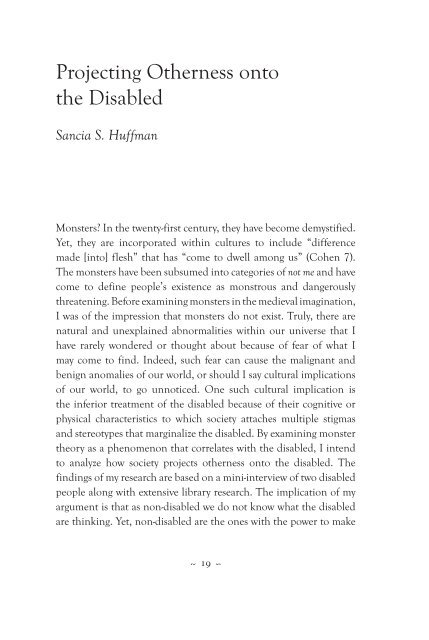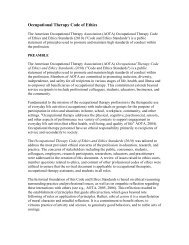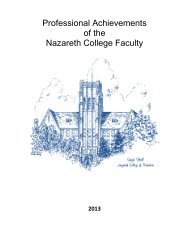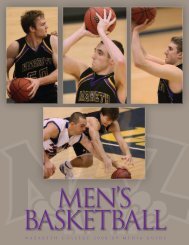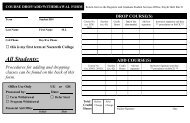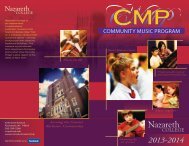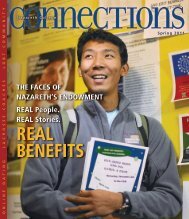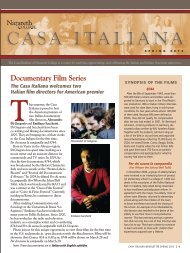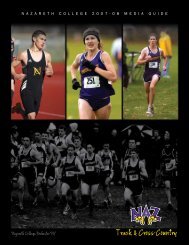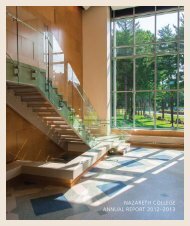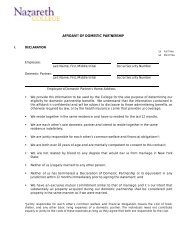- Page 1 and 2: Afternoons of Alterity A Codex of t
- Page 4 and 5: Table of ContentsFrom Medieval Mars
- Page 6 and 7: From Medieval Marsh Monsters toFutu
- Page 8 and 9: imagination, we must first attempt
- Page 10 and 11: seed of monstrosity within themselv
- Page 12 and 13: essence as a monster, it seems reas
- Page 14 and 15: she bore two sons, one from the imp
- Page 16 and 17: perhaps, anti-heroes) of the futuri
- Page 18 and 19: to watch the murder and mutilation
- Page 20 and 21: and modern audiences through their
- Page 22 and 23: Works Cited“Bushwhacked.” Firef
- Page 26 and 27: in any systematic structuration. An
- Page 28 and 29: The idea of the monstrous’ vulner
- Page 30 and 31: not us and are in the proximity of
- Page 32: they want to be treated. The interv
- Page 36: Monstrosity and theIrruption of Rea
- Page 39 and 40: describing his fears of this place
- Page 41 and 42: stained with sin” (Spearing 221).
- Page 43: often and at will to show man somet
- Page 46 and 47: What’s Love Got To Do With It?The
- Page 48 and 49: story than as the beginning? What f
- Page 50 and 51: It is textual content like this tha
- Page 52 and 53: through the story as the Green Knig
- Page 54 and 55: the first advocating voices for end
- Page 56 and 57: “capable of seeing things objecti
- Page 58 and 59: Darkness: The True Monster ofLitera
- Page 60 and 61: the way they can make us feel, but
- Page 62 and 63: not only closes out, extinguishes,
- Page 64 and 65: and temptation, most especially for
- Page 66 and 67: hours “led to the term ‘night
- Page 68 and 69: specifically his relationship to da
- Page 70 and 71: humanization of Grendel draws the r
- Page 72 and 73: subconscious the message may be. Th
- Page 74 and 75:
Serial MonstrosityEmily Mastrobatti
- Page 76 and 77:
is clear that they are monsters and
- Page 78 and 79:
murderer that he once was. He has b
- Page 80 and 81:
of the killing, “When investigato
- Page 82 and 83:
ook “contains recipes from the bo
- Page 84 and 85:
asks Charles Manson to marry her, t
- Page 86 and 87:
Monstrous Mothers andObjectified Da
- Page 88 and 89:
and her sisters plot to kill their
- Page 90 and 91:
easons for “otherness.” On top
- Page 92 and 93:
The original ideas are still intact
- Page 94 and 95:
objectified creature. “Cultures o
- Page 96 and 97:
Works CitedAcker, P. Horror and the
- Page 98 and 99:
Grendel: A Manifestation ofMedieval
- Page 100 and 101:
ut never was his physicality hinted
- Page 102 and 103:
to wander in the darkness and the c
- Page 104 and 105:
Magic could not resurrect Grendel t
- Page 106 and 107:
Works CitedBeowulf. Trans. RM Liuzz
- Page 108 and 109:
The Monster Under the BedThe Creati
- Page 110 and 111:
to procreate but the accepted manif
- Page 112 and 113:
Cain had/killed his father’s son
- Page 114 and 115:
can, without a doubt, be placed int
- Page 116 and 117:
The vagina’s ability to function
- Page 118:
Ed. Barbara K. Gold, et all. Albany
- Page 121 and 122:
To understand precisely how states
- Page 123 and 124:
a strict delineation between each g
- Page 125 and 126:
monstrous and societal rules to fol
- Page 127 and 128:
Gawain is willing to accept his mis
- Page 129 and 130:
survive, challenge, and defeat. Esp
- Page 131 and 132:
governmental standards, then are we
- Page 134 and 135:
They Walk Among UsOccupational Viol
- Page 136 and 137:
sports and regard our members of th
- Page 138 and 139:
modern readers are not part of the
- Page 140 and 141:
otherness and disdain for humanity.
- Page 142 and 143:
are underpaid and for the most part
- Page 144 and 145:
Home and Spatial IdentityPhysical t
- Page 146 and 147:
closeness among the people that the
- Page 148 and 149:
Into the dark gorge I ventured; the
- Page 150 and 151:
the treasures that fill up their ho
- Page 152 and 153:
threatened by the very existence of
- Page 154 and 155:
and draped in damp, shaggy moss, an
- Page 156 and 157:
individual. Home resides within the
- Page 158:
Works CitedArmitage, Simon. Sir Gaw


